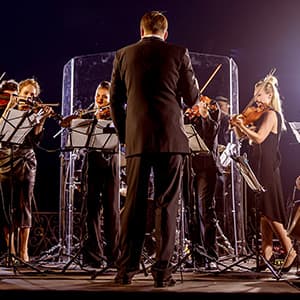

Copland Tickets
Up to 30% Off Compared to Competitors.
Location: Select Location (e.g, New York)
Events Nearby
We're Sorry. There are currently no events near you.
About Copland
Currently, Aaron Copland's music continues to be celebrated in concert halls around the world. Various orchestras and ensembles regularly perform his works, often featuring them in themed concerts that highlight American music. In recent years, there has been a resurgence of interest in Copland's compositions, with many orchestras programming 'Appalachian Spring' and 'Fanfare for the Common Man' in their season line-ups. Special events and commemorative concerts often take place around his birthday and the anniversary of his notable works, bringing together musicians and audiences to appreciate his contributions to the arts. Additionally, collaborations between contemporary artists and orchestras have led to innovative performances that reinterpret Copland's music for modern audiences. Festivals dedicated to American music frequently include Copland's pieces, showcasing their relevance and timelessness. As a part of ongoing efforts to promote his legacy, various educational initiatives aim to teach young musicians about his influence on American concert music, ensuring that his spirit continues to inspire the next generation of composers and performers.
Copland History
Aaron Copland, often referred to as the 'Dean of American Composers,' was born on November 14, 1900, in Brooklyn, New York. His early education in music began at the age of 15, and he went on to study at the Paris Conservatory. Copland's unique style emerged in the 1930s, where he began to incorporate elements of American folk music into his compositions, creating works that resonated with a broader audience. His breakthrough came with the ballet 'Appalachian Spring' in 1944, which showcased his ability to blend classical music with American themes. Throughout his career, Copland composed numerous works for orchestra, chamber ensembles, and solo instruments, including 'Fanfare for the Common Man' and 'Billy the Kid.' His music is characterized by its rhythmic vitality, clarity of texture, and innovative use of dissonance, which has left a lasting impact on American music. Copland's legacy is not only found in his compositions but also in his contributions to music education and advocacy for American composers, making him a pivotal figure in the history of American concert music.
